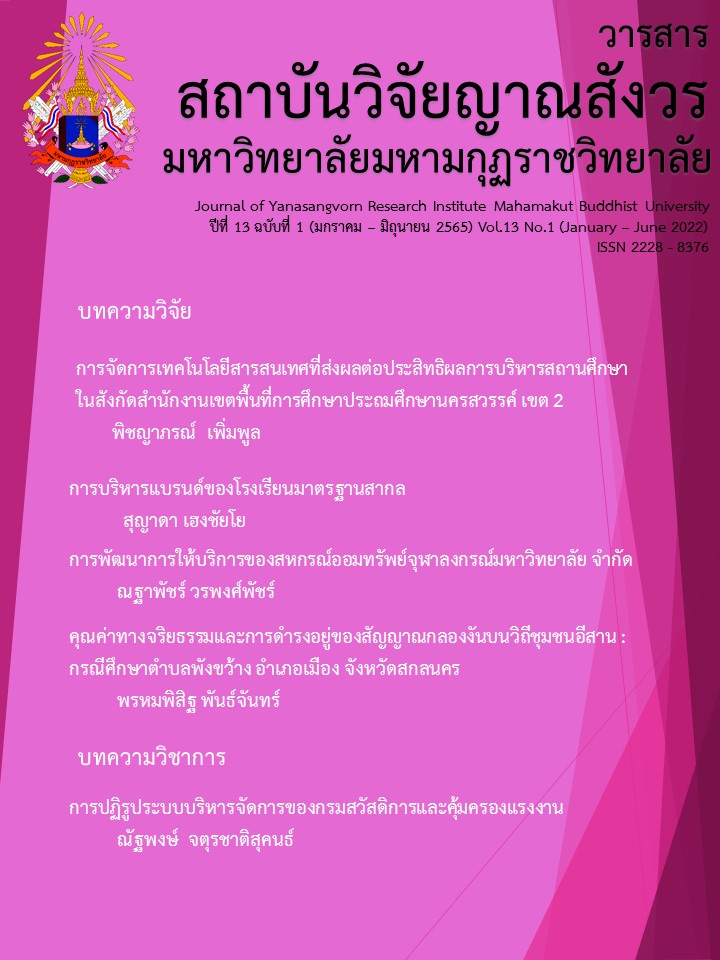BRAND MANAGEMENT OF WORLD - CLASS STANDARD SCHOOL
Main Article Content
Abstract
The purposes of this research were 1.to identify the factor of brand management of world-class standard schools and 2.to verify the factor of brand management of world-class standard schools. The research populations consisted of 232 schools of world-class standard schools The sample size was determined and based on Krejcie and Morgan’s Sample Size Table. The sample obtained from stratified random sampling consisted of 148 secondary schools in Thailand. The 296 respondents included school directors and school heads of Assurance Quality. There were only 288 respondents sending back the questionnaires (97.30% of the sample). The research instruments were the semi-structured interview, the opinionnaire, and the questionnaire of verify the research findings. The statistics used to analyze the data analysis were frequency, percentage, arithmetic mean, standard deviation, and Exploratory Factor Analysis and content analysis.
The findings of this research were as follows:
1.The factor of brand management of world-class standard schools were six factors namely: 1.Quality Management, 2.the recommendation recognition culture of stakeholder, 3. Communication, 4. Keep a promise 5. Mentoring in Organizations, and 6. Development Strategies Management.
2.The experts confirmed factors of brand management of world-class standard schools were verified to meet with accuracy standards, propriety standards, feasibility standards, and utility standards.
Article Details

This work is licensed under a Creative Commons Attribution-NonCommercial-NoDerivatives 4.0 International License.
References
กุณฑลี รื่นรมย์. (2556). แบรนด์องค์กร การประเมินค่าแบรนด์องค์กร Corporate Brand Success Valution. กรุงเทพฯ: ไซเบอร์ปริ้นท์.
ชมัยพร วิเศษมงคล. Branding : กลยุทธ์เพื่อการแข่งขันอย่างยั่งยืน. เข้าถึงเมื่อ 22 ธันวาคม พ.ศ.2562. เข้าถึงได้จาก http://utcc2.utcc.ac.th/localuser/brandthaicenter/Article%20etc/ Branding
ปิยะชาติ อิศรภักดี. (2559). Branding 4.0. กรุงเทพมหานคร: อัมรินทร์พริ้นติ้งแอนด์พับลิชชิ่ง.
พจน์ ใจชาญสุขกิจ.(2558). กลยุทธ์การสื่อสารเพื่อบริหารแบรนด์และสื่อสารการตลาดในยุคดิจิทัล. กรุงเทพมหานคร: สมาคมประชาสัมพันธ์ไทย.
สำนักงานสภาพัฒนาการเศรษฐกิจและสังคมแห่งชาติ. (2562). รายงานการศึกษาผลกระทบจากการเปลี่ยนแปลงโครงสร้างประชากร และข้อเสนอแนะเชิงนโยบายต่อการพัฒนาประเทศ จากผลการคาดประมาณประชากรของประเทศไทย. กรุงเทพฯ: สำนักงานสภาพัฒนาการเศรษฐกิจ และสังคมแห่งชาติ.
Black, Iain and Cleopatra Veloutsou. (2017). “Working consumers: co-creation of brand identity, consumer identity and brand community identity.” Journal of Business Research 70 (September): 416-429.
Kaiser, H. F. (1960). “The Application of Electronic Computers to Factor Analysis.” Educational and Psychological Measurement, 20(1): 141–151.
Urde, Mats. (2016). “The brand core and its management over time.” Journal of Product& Brand Management 25(1): 26-42.
Varadarajan, B. and Timothy Malone. (2018). “Branding Strategies of a Private International School.” The Qualitative Report 23(4): 932-948.


